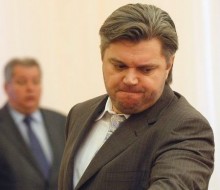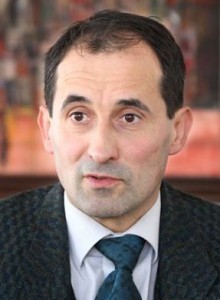Ukrainehas to accelerate reforms in energy sector. Such statement was made at the Fourth European-Ukrainian Energy Day by the Director of Energy Community Secretariat Janez Kopac. In terms of power and influence he is the second person in energy issues in Europe. However, despite the importance of his status, the visit of Mr. Kopac has been practically ignored by the state authorities (judging from what he said). “Last time I met with the Deputy Minister Volodymyr Makukha. I also had a meeting scheduled with the Minister of Energy and Coal Industry Eduard Stavytsky, but it was canceled at the last moment, that’s why I had a meeting with Makukha. This time no official meetings have been confirmed. I tried to contact the other deputies, but there’s been no result so far,” Kopac noted the hospitality of the Ukrainian authorities.
Well, it seems that the Ukrainian authorities do not care about getting a piece of advice from the VIP official in the energy sector. There can be various reasons for such behavior. Perhaps, the state officials have not been informed about the arrival of a distinguished guest. Or maybe the Cabinet of Ministers and the Energy Ministry know already the set of European pieces of advice in energy sector but cannot offer any specific solutions in response, therefore, they try to rather avoid treading on a painful corn. Besides there is a high-profile bill on the privatization of the Ukrainian GTS (political parties already named it the full surrender of the “gas pipe” to Russia), which, according to the admission of its developers, appeared as a result of Ukraine’s fulfillment of the conditions for accession to the Energy Community. Thus, a lot of awkward questions have accumulated lately that should be discussed by both parties. Whatever the explanation may be, but the fact remains a fact: the position of the Director of the Energy Community Secretariat has been heard in Ukraine by the mass media, at least.
During his speech at the Fourth European-Ukrainian Energy Day Kopac said that the progress of Ukraine within the framework of development of common energy market with the EU is delayed. “Common energy market is a part of the conditions of the third energy pact. But honestly, only the Burshtynsky Island can become a part of this energy market right now, because the rest of Ukraine is not synchronized with the EU electrical network. That’s why, there will be a delay here,” said Kopac.
According to Kopac, other issues have also not been resolved. Answering the question of the Ukrainian mass media on whether the issues raised in two official letters (about the access to the electrical network of the Burshtynsky Island and the sulfur content of liquid fuels), sent by the Secretariat to the Ukrainian government, have been resolved, the top Europe’s official replied: “These issues are being slowly resolved, but at least they haven’t been ignored.”
“The European Union will never lose interest in Ukraine, because it is its neighbor. I believe, with or without gas, Ukraine will always be interesting for the EU. The existing Ukrainian pipelines are designed for transporting approximately 95 billion cubic meters of gas per year. As far as I know, during the last period, only 55 billion cubic meters of gas were transported, a little bit more than a half. This is not a result of any political processes, but this is a result of the economic crisis, new LNG terminals around Europe, which bring liquefied natural gas from all around the world, which is cheaper than Russian gas.”
The Day, as opposed to government officials, met with the director of the Energy Community Secretariat and found out his opinion on major energy issues that are raised in Ukraine now.
“First of all, I cannot comment on things adopted by the EU, since I am representing the Energy Community Secretariat. Secondly, the European Union is never financing any projects in non-member states. Well, to be honest, it slightly finances some things like infrastructure in member states, but never in neighboring countries. The EU is always helping with technical assistance and similar not very big things, financially. But, what is important, if you are in compliance with the European legal framework, it is much easier for you to get financial resources from international financial institutions, including the European Bank for Reconstruction and Development, and the European Investment Bank.”
It was mentioned during the conference that Ukrainian gas transportation system might be managed by Russia, and Europe will not participate in this process. What do you think about this? Since previously, there was an idea of a consortium between Ukraine, Russia, and Europe.
“Potentially, consortiums are always consortiums of companies. It could happen that some of European, let’s say, German, French companies are interested in this, I don’t know. But the EU, as an institution, never enters any such commercial projects. But as I already explained during the press conference, the most important thing is that rules of transparency, so-called third-party access, and allowed competition when we are talking about the access to the pipelines, is respected. It is not that important who is an owner. But I can say that I believe that having Gazprom as an owner would not help to respect such rules. We can see problems emerging in some countries where Gazprom is a majority owner of pipelines, and I believe that such problems will be repeated in the Ukrainian case as well.”
UKRAINEWILL ALWAYS BE INTERESTING FOR THE EU
Won’t the development of new sources of alternative energy along with the construction of other pipelines make Europe lose interest in Ukrainian gas transportation system?
“The European Union will never lose interest in Ukraine, because it is its neighbor. I believe, with or without gas, Ukraine will always be interesting for the EU. The existing Ukrainian pipelines are designed for transporting approximately 95 billion cubic meters of gas per year. As far as I know, during the last period, only 55 billion cubic meters of gas were transported, a little bit more than a half. This is not a result of any political processes, but this is a result of the economic crisis, new LNG terminals around Europe, which bring liquefied natural gas from all around the world, which is cheaper than Russian gas. I believe this trend will continue. Personally, I do not think that the South Stream will be built at all. It could not be lucrative, there is no economic logic in it. There are new pipelines foreseen. For example, the Trans Adriatic Pipeline, which should bring gas from Azerbaijan to southern Italy. This project is relatively serious, though I do not know whether it will happen or not. Also, there is the Nabucco West Pipeline. But I want to say that this trend of lowering the usage of existing capacities will continue. So, I do not see very much logic for new Russian gas pipeline.”
7-BILLION-DOLLAR GAS DEBT IS A RESULT OF INTERNAL BEHAVIOR OF UKRAINIAN AUTHORITIES IN THE PAST
Does the Energy Community feel guilty because Ukraine is forced now to compromise with Russia on the matter of ownership of its gas transportation system? When Ukraine faced the problem of the huge 7-billion-dollar gas debt which Russia was hinting at, both the Energy Community and Europe were silent.
“This debt was not a result of anything that the European Union or the Energy Community would suggest or support, it is completely a result of internal behavior of Ukrainian authorities in the past. But the EU understands this, and this is also the reason why it is negotiating an accession agreement with Ukraine and this is also not something that would be only on paper, it means money as well. Everything always depends only on internal decisions of the Ukrainian authorities. There is one of the important reasons for this debt: the inappropriate price of gas. And this price is set by decision made by the Ukrainian government. The EU, on the other hand, suggests price liberalization and definition and support of vulnerable customers through public finances, not through cross-subsidizing. The European Union is supporting through energy efficiency measures, which are, unfortunately, not very efficient in Ukraine, and would lower the consumption of gas and dependency on Russian gas. So in the end, every country, especially a big country like Ukraine, always relies on its own decisions. Small countries are sometimes victims of big games, but Ukraine definitely relies on its own decisions.”
Did Ukraine, as a member of the Energy Community, address it with a request for help with re-paying the gas debt?
“As far as I know, this debt is coming out of the contract with Gazprom, which was signed by the former government. We do not know it officially, we read about it in newspapers, but nobody ever sent it to us. Relating to this agreement with Gazprom, we have never been asked for any advice. If somebody would ask us, we would give advice, of course. And this has not changed from past up to now.”
Has Ukraine asked for any advice or legal opinion regarding the project for GTS privatization?
“No, not yet, but we know about it, because the last time we visited Deputy Minister Makukha, he informed us that this was being prepared.”
GTS PRIVATIZATION HAS NOTHING TO DO WITH OBLIGATIONS UNDER THE ENERGY COMMUNITY TREATY
Was there any intention from the government to ask the Energy Community for their opinion?
“No, I don’t know about this. I should consult my expert if he had any contacts, I cannot say for sure whether there was no contact at all. But once again, GTS privatization has nothing to do with obligations under the Energy Community treaty.”
In your opinion, what is the best and the most efficient option for Ukrainian GTS reformation?
“I do not dare to comment, because I do not know many facts. I do not know the financial situation and all the difficulties, so I cannot give an advice, even a personal one. But of course, these pipelines have to be refitted and maintained, or a normal tariff should be established to keep them in a good condition, because the tariff is a price for using the gas pipelines. And this, of course, has influence on the price of gas.”
Do you think Ukraine will be able to become energy independent from Gazprom in the future, if it follows its current pace of modernizing the gas transportation system?
“Reforms are really too slow, I cannot say much about it.”








